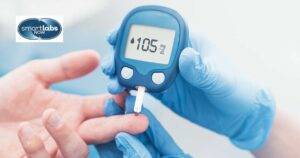
Carbon dioxide (CO2) plays a crucial role in maintaining your body’s acid-base balance.
A CO2 blood test helps assess lung, kidney, and metabolic health, providing essential insights into your overall well-being.
Whether you’re experiencing symptoms of CO2 imbalance or just keeping up with routine health checks, understanding this test can help you take charge of your health.
In Portland, Oregon, individuals have access to various testing options, including at-home test kits and laboratory-based evaluations.
When it comes to certified lab options in and around Portland, Smart Labs Now stands out as a reliable option.
Book Your CO2 Blood Test Today!

Your body’s ability to maintain a stable pH depends largely on carbon dioxide levels.
A CO2 blood test provides critical information that helps diagnose and monitor various health conditions:
This 2025 guide by Ultra Lab Tests explains the significance of CO2 blood tests in assessing acid-base balance and diagnosing potential health issues.
Ensures the body maintains a proper pH level, preventing metabolic imbalances.
Detects lung conditions like COPD, asthma, or respiratory failure.
Evaluate how well the kidneys regulate CO2 and maintain electrolyte balance.
Helps diagnose metabolic acidosis or alkalosis, conditions that can impact energy levels and overall health.
Measures bicarbonate (HCO3), a vital buffer in the blood that helps regulate acidity.
Determines CO2 levels and blood pH to assess lung and metabolic function comprehensively.

A normal CO2 level in venous blood typically falls between 23-29 mmol/L, but variations can indicate underlying issues:
Your healthcare provider will interpret your results based on your symptoms, medical history, and any additional tests performed.
This 2022 article by Cleveland Clinic provides an overview of CO2 blood tests, including their purpose, procedure, and interpretation of results.
Proper preparation helps ensure accurate test results.
Consider the following:
Not usually necessary but may be required if part of a broader metabolic panel.
Inform your provider about any corticosteroids, antacids, diuretics, or supplements that could affect CO2 levels.
If you have kidney disease, lung disease, or metabolic disorders, discuss any special precautions before the test.
Report any unexplained symptoms such as fatigue, confusion, or shortness of breath, which could indicate an electrolyte imbalance.
Consult with your doctor for personalized preparation steps based on your overall health.
A CO2 blood test is a simple procedure performed by a healthcare professional:

Once results are available, your doctor will analyze them concerning your overall health.
Here’s what different readings might indicate:
Suggests conditions like COPD, kidney disease, or metabolic alkalosis.
May indicate metabolic acidosis, respiratory alkalosis, or electrolyte disturbances.
The test is often part of an electrolyte panel, which evaluates the body’s sodium, potassium, and bicarbonate levels.
Helps differentiate between metabolic and respiratory causes of CO2 imbalances.
If your results fall outside the normal range, your provider may order additional tests to determine the underlying cause.

This 2025 article by Rupa Health discusses the symptoms, causes, and treatment options for elevated CO2 levels in the blood.
If your CO2 levels are too high or too low, treatment depends on the underlying cause:
It may require pulmonary rehabilitation, oxygen therapy, or diuretic medications and could indicate conditions such as COPD, respiratory failure, or kidney disease.
Treatment may involve sodium bicarbonate supplements, dietary adjustments, or managing an underlying metabolic disorder, as conditions like lactic acidosis, Addison’s disease, or severe infections can contribute to low CO2 levels.
Restoring balance may require fluids, dietary adjustments, or IV electrolyte therapy.
Regular monitoring and appropriate treatment can help maintain stable CO2 levels and prevent complications.

After your test, results are typically available within a few hours to a couple of days, depending on the testing method:
Most labs provide results quickly, especially if the test is part of a blood gas analysis.
Your provider may discuss them over the phone, through an online portal, or in a follow-up appointment.
Results are reported in mmol/L (millimoles per liter) or mEq/L (milliequivalents per liter), depending on the lab.
Medications, dehydration, or underlying health conditions may influence CO2 levels.
Your provider may recommend further tests or immediate treatment if your results are abnormal.
A CO2 blood test is generally safe, but minor risks include:
If you experience severe side effects, consult your healthcare provider immediately.
This 2022 article by Cleveland Clinic outlines the CO2 blood test procedure and potential risks associated with abnormal CO2 levels.
Proactively managing your health can help prevent CO2 imbalances:
It supports metabolic function and maintains electrolyte stability.
Enhances lung function and CO2 regulation.
Reduces lung-related CO2 retention and improves respiratory health.
Prevents CO2 buildup by improving oxygen exchange.
Proper fluid intake supports kidney function and acid-base balance.
If you have a chronic condition, adhering to prescribed treatments is essential for maintaining stable CO2 levels.

At Smart Labs Now, we provide fast, accurate, and professional CO2 blood testing services in Portland, Oregon.
Our tests are conducted by experienced professionals, ensuring reliable results.
Book Your CO2 Blood Test Today!
DISCLAIMER
Please consult your primary care physician before engaging with any pharmaceutical, natural substances, or activity regimens mentioned or prescribed in this post. Smart Labs Now is not responsible for health or life outcomes based on the information or recommendations provided. This account does not serve as a substitute for professional medical advice/help.